In this article I will describe how to install the very first available release of Oracle Database 19c (19.2.0.0) binaries on Oracle Linux 7.6. Even though it's not officially released for Oracle Linux non-Exadata yet, in edelivery it is available an Exadata DB version that is compatible with your local machine running OL.
Use it for test purposes only and to see what is coming in this new release.
First of all open https://edelivery.oracle.com/ and Sign In.
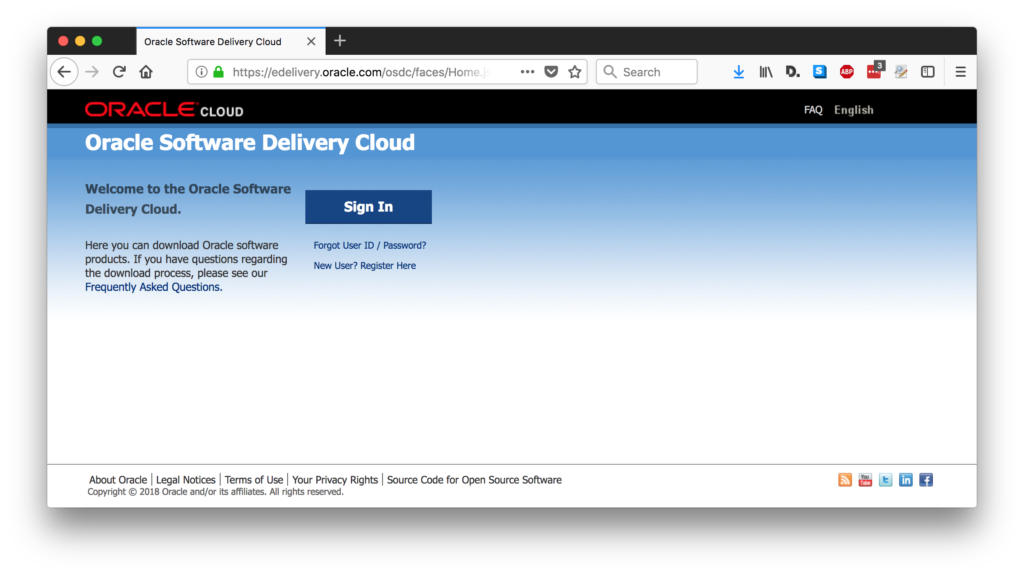
Search for "Oracle Database (Available and Supported only on Exadata)".
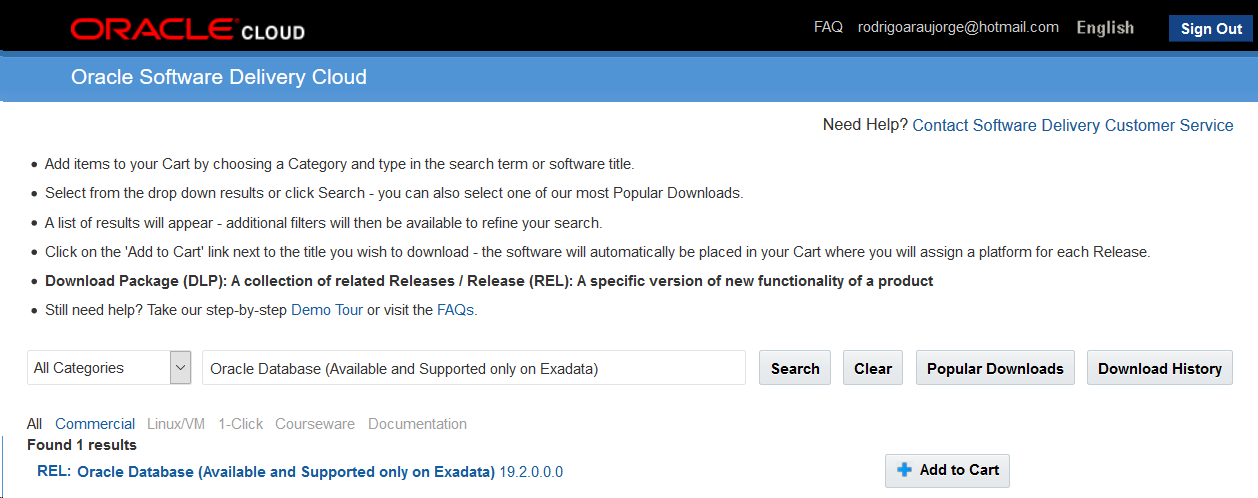
Add the REL: Oracle Database (Available and Supported only on Exadata) 19.2.0.0.0.
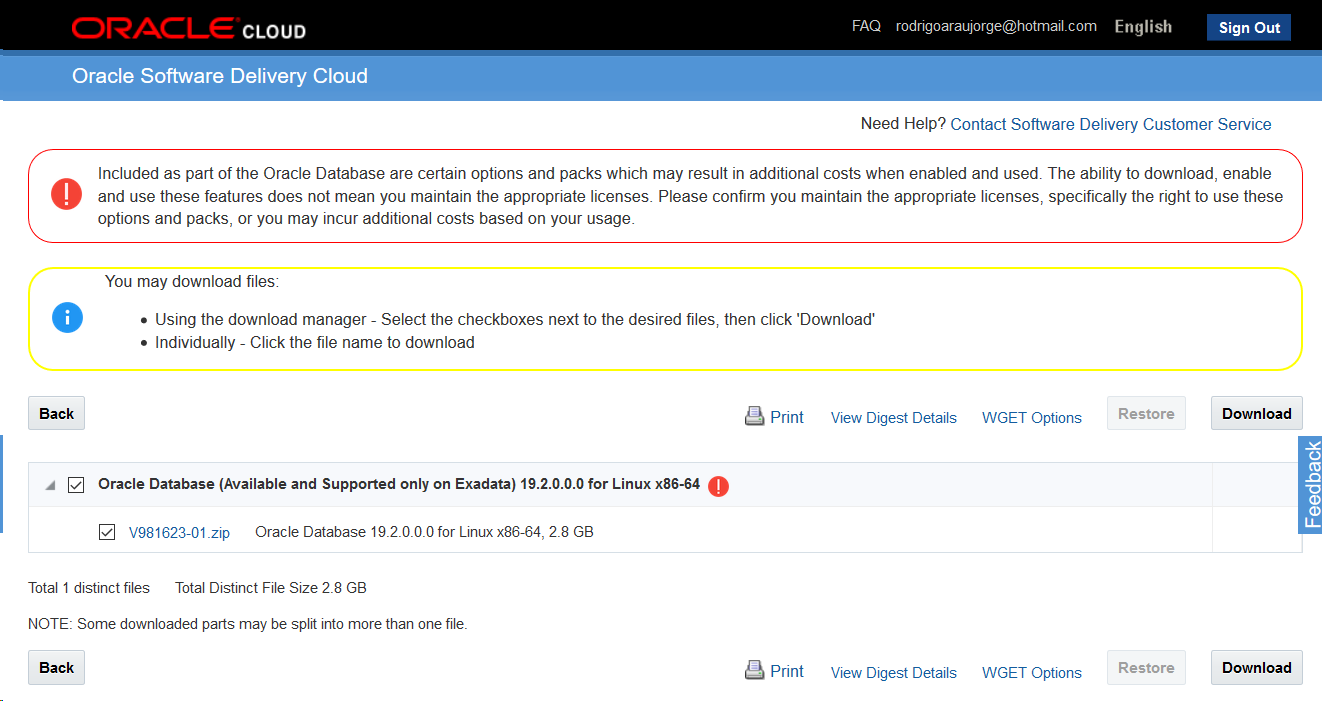
Now you can either download the file to your machine or generate the WGET script to download it directly to your linux server. In my case I downloaded the zip file and transferred to my Virtual Box.
Keep this file for later usage. Now let's start preparing our VM.
I've deployed a brand new Oracle Linux 7.6 using vagrant with 2G RAM only. It's available at this link: https://github.com/oracle/vagrant-boxes/.
I used vagrant because its very fast and easy to deploy a server, taking less than 10 minutes (not kidding). However, you may also use your own cloud/virtual/physical server.
So the first step is to check the hostname of your machine to /etc/hosts with it's own IP (not 127.0.0.1), or listener configuration will fail:
[root@ol7-vagrant ~]# hostname
ol7-vagrant
[root@ol7-vagrant ~]# ifconfig
eth0: flags=4163<UP,BROADCAST,RUNNING,MULTICAST> mtu 1500
inet 10.0.2.15 netmask 255.255.255.0 broadcast 10.0.2.255
inet6 fe80::a00:27ff:fe20:edbc prefixlen 64 scopeid 0x20<link>
ether 08:00:27:20:ed:bc txqueuelen 1000 (Ethernet)
RX packets 48172 bytes 12616731 (12.0 MiB)
RX errors 0 dropped 0 overruns 0 frame 0
TX packets 27309 bytes 3558673 (3.3 MiB)
TX errors 0 dropped 0 overruns 0 carrier 0 collisions 0
lo: flags=73<UP,LOOPBACK,RUNNING> mtu 65536
inet 127.0.0.1 netmask 255.0.0.0
inet6 ::1 prefixlen 128 scopeid 0x10<host>
loop txqueuelen 1000 (Local Loopback)
RX packets 53385 bytes 17629596 (16.8 MiB)
RX errors 0 dropped 0 overruns 0 frame 0
TX packets 53385 bytes 17629596 (16.8 MiB)
TX errors 0 dropped 0 overruns 0 carrier 0 collisions 0
[root@ol7-vagrant ~]# cat /etc/hosts
10.0.2.15 ol7-vagrant ol7-vagrant
127.0.0.1 localhost localhost.localdomain localhost4 localhost4.localdomain4
::1 localhost localhost.localdomain localhost6 localhost6.localdomain6
[root@ol7-vagrant ~]#
Next, let's speed up the things downloading all the pre-reqs with yum. Note that the 18c preinstall works well for 19c DB:
[root@ol7-vagrant ~]# yum install -y oracle-database-preinstall-18c.x86_64 ol7_UEKR5 | 1.2 kB 00:00:00 ol7_addons | 1.2 kB 00:00:00 ol7_developer | 1.2 kB 00:00:00 ol7_developer_EPEL | 1.2 kB 00:00:00 ol7_latest | 1.4 kB 00:00:00 ol7_optional_latest | 1.2 kB 00:00:00 Resolving Dependencies --> Running transaction check ---> Package oracle-database-preinstall-18c.x86_64 0:1.0-1.el7 will be installed ( many more lines suppressed ) Installed: oracle-database-preinstall-18c.x86_64 0:1.0-1.el7 Dependency Installed: bc.x86_64 0:1.06.95-13.el7 bind-libs.x86_64 32:9.9.4-73.el7_6 bind-utils.x86_64 32:9.9.4-73.el7_6 compat-libcap1.x86_64 0:1.10-7.el7 compat-libstdc++-33.x86_64 0:3.2.3-72.el7 gssproxy.x86_64 0:0.7.0-21.el7 keyutils.x86_64 0:1.5.8-3.el7 ksh.x86_64 0:20120801-139.0.1.el7 libICE.x86_64 0:1.0.9-9.el7 libSM.x86_64 0:1.2.2-2.el7 libX11.x86_64 0:1.6.5-2.el7 libX11-common.noarch 0:1.6.5-2.el7 libXau.x86_64 0:1.0.8-2.1.el7 libXext.x86_64 0:1.3.3-3.el7 libXi.x86_64 0:1.7.9-1.el7 libXinerama.x86_64 0:1.1.3-2.1.el7 libXmu.x86_64 0:1.1.2-2.el7 libXrandr.x86_64 0:1.5.1-2.el7 libXrender.x86_64 0:0.9.10-1.el7 libXt.x86_64 0:1.1.5-3.el7 libXtst.x86_64 0:1.2.3-1.el7 libXv.x86_64 0:1.0.11-1.el7 libXxf86dga.x86_64 0:1.1.4-2.1.el7 libXxf86misc.x86_64 0:1.0.3-7.1.el7 libXxf86vm.x86_64 0:1.1.4-1.el7 libaio-devel.x86_64 0:0.3.109-13.el7 libbasicobjects.x86_64 0:0.1.1-32.el7 libcollection.x86_64 0:0.7.0-32.el7 libdmx.x86_64 0:1.1.3-3.el7 libevent.x86_64 0:2.0.21-4.el7 libini_config.x86_64 0:1.3.1-32.el7 libnfsidmap.x86_64 0:0.25-19.el7 libpath_utils.x86_64 0:0.2.1-32.el7 libref_array.x86_64 0:0.1.5-32.el7 libstdc++-devel.x86_64 0:4.8.5-36.0.1.el7 libtirpc.x86_64 0:0.2.4-0.15.el7 libverto-libevent.x86_64 0:0.2.5-4.el7 libxcb.x86_64 0:1.13-1.el7 lm_sensors-libs.x86_64 0:3.4.0-6.20160601gitf9185e5.el7 mailx.x86_64 0:12.5-19.el7 nfs-utils.x86_64 1:1.3.0-0.61.0.1.el7 psmisc.x86_64 0:22.20-15.el7 quota.x86_64 1:4.01-17.el7 quota-nls.noarch 1:4.01-17.el7 rpcbind.x86_64 0:0.2.0-47.el7 smartmontools.x86_64 1:6.5-1.el7 sysstat.x86_64 0:10.1.5-17.el7 tcp_wrappers.x86_64 0:7.6-77.el7 unzip.x86_64 0:6.0-19.el7 xorg-x11-utils.x86_64 0:7.5-23.el7 xorg-x11-xauth.x86_64 1:1.0.9-1.el7 Complete! [root@ol7-vagrant ~]#
Cool. Now I got all the pre-reqs installed. Next step is to transfer and the installation files:
Fine, now this part is important. Different from common pre-18c Oracle Database installation binaries, this one is the ORACLE_HOME ready to be deployed. You will still need to call the ./runInstaller, but the zip itself is already the ORACLE_HOME. So you will need to extract it directly to the place we want your binaries to be placed:
[root@ol7-vagrant ~]# mkdir -p /u01/app/oraInventory [root@ol7-vagrant ~]# mkdir -p /u01/app/oracle/product/19.2.0/dbhome_1 [root@ol7-vagrant ~]# chown -R oracle: /u01/app/oraInventory [root@ol7-vagrant ~]# chown -R oracle: /u01/app/oracle [root@ol7-vagrant ~]# su - oracle [oracle@ol7-vagrant ~]$ unzip -q /vagrant/V981623-01.zip -d /u01/app/oracle/product/19.2.0/dbhome_1/
Now we are ready to install it.
[oracle@ol7-vagrant ~]$ export ORACLE_HOME=/u01/app/oracle/product/19.2.0/dbhome_1 [oracle@ol7-vagrant ~]$ /u01/app/oracle/product/19.2.0/dbhome_1/runInstaller Launching Oracle Database Setup Wizard...
And here we go. Choose "Create and configure a single instance database":
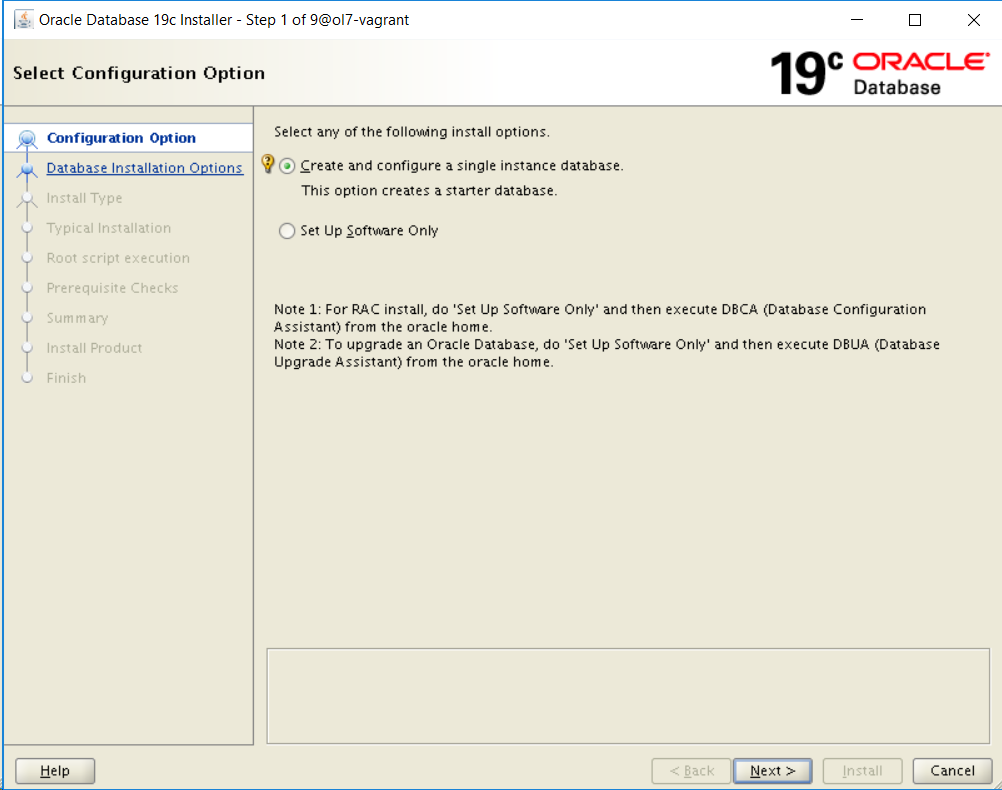
In next screen select "Server class" for more advanced options:
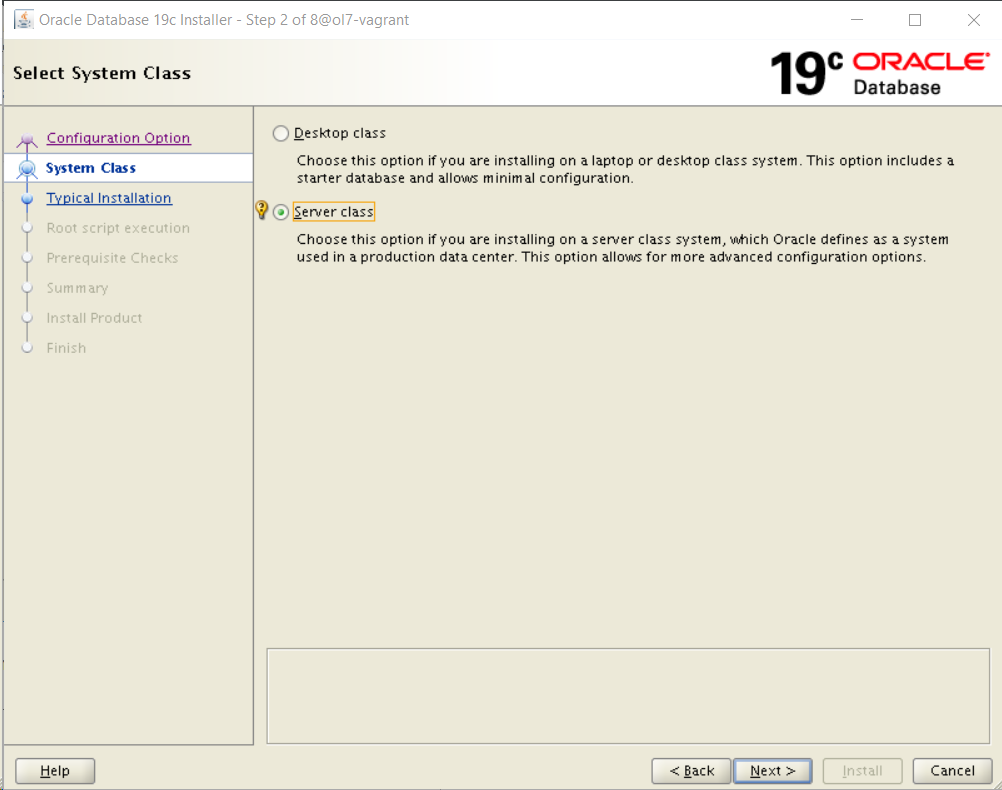
Let's go with "Enterprise Edition":
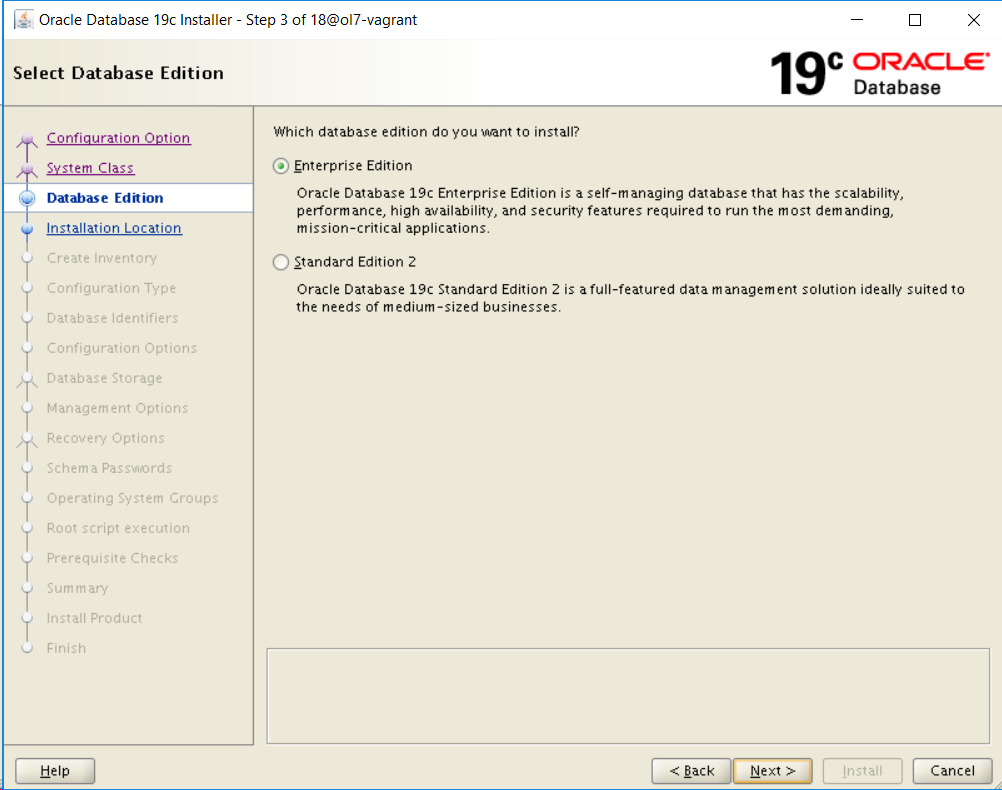
In next screen where we choose the Oracle base folder:
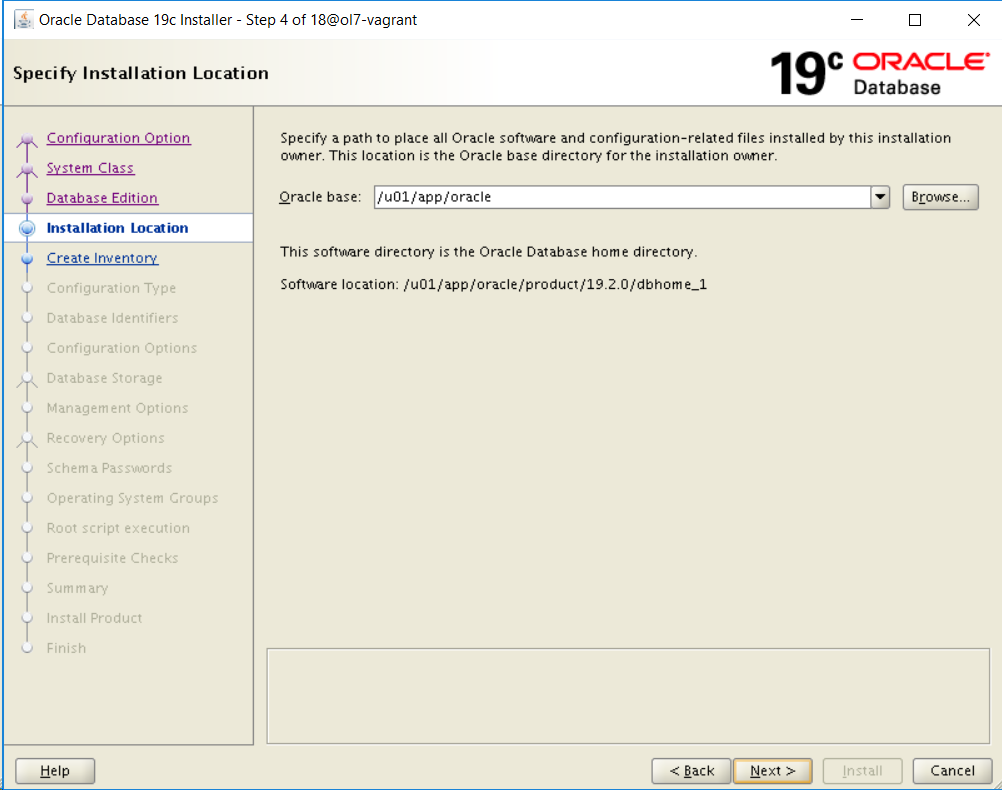
Set the inventory directory:
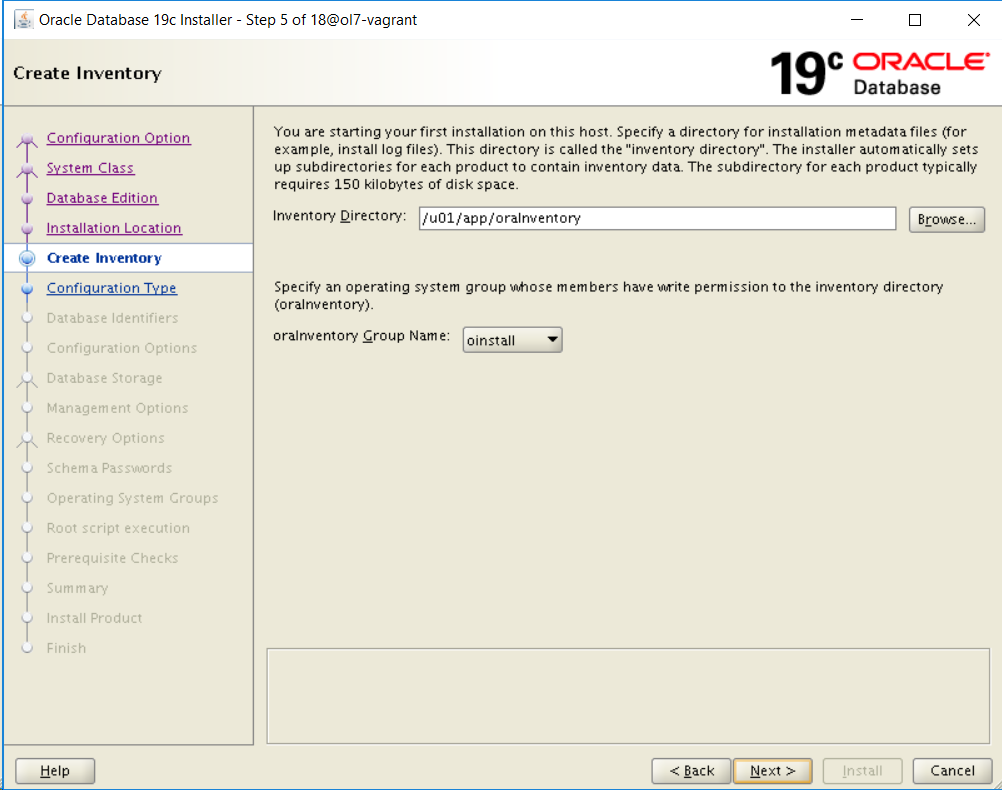
Let's go with a General Purpose DB:
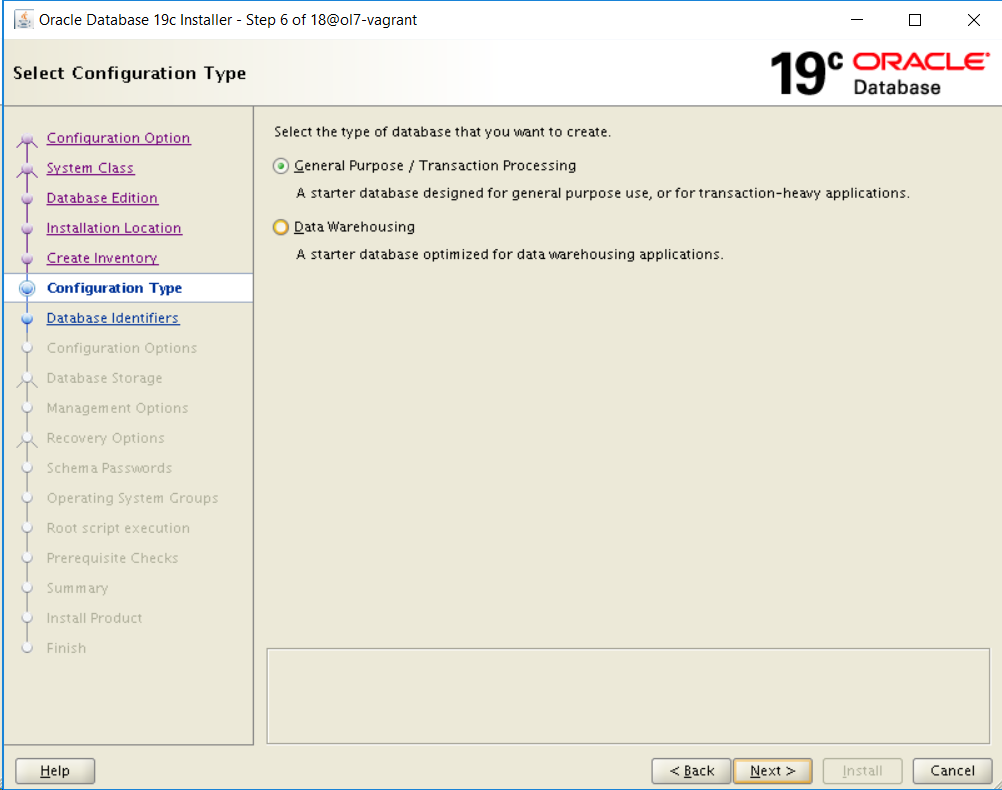
Keeping my DB name as orcl:
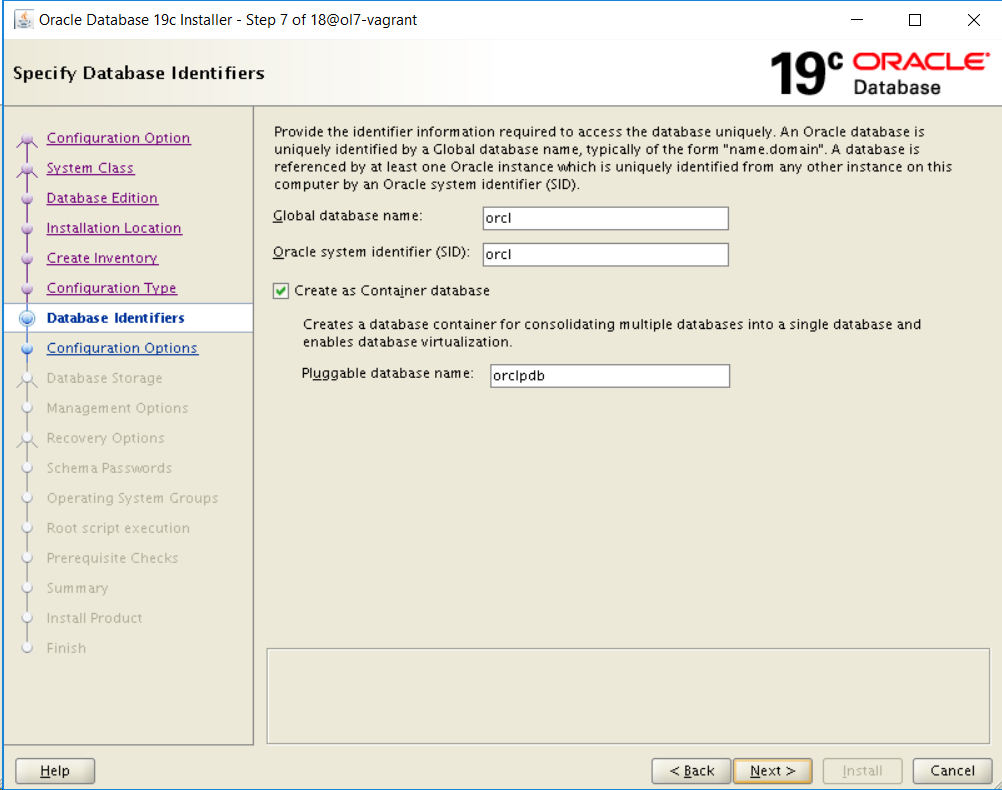
Now I will keep memory very low as my whole machine has only 2G:
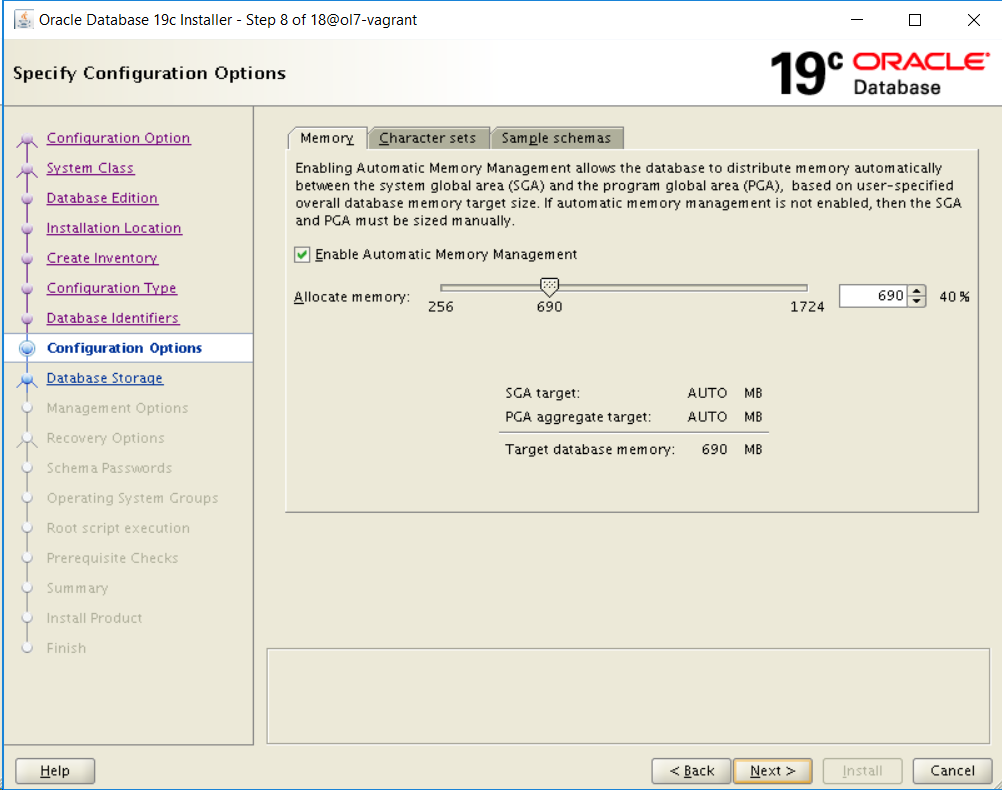
Next screen is the data file location. I will keep it in my Oracle Base:
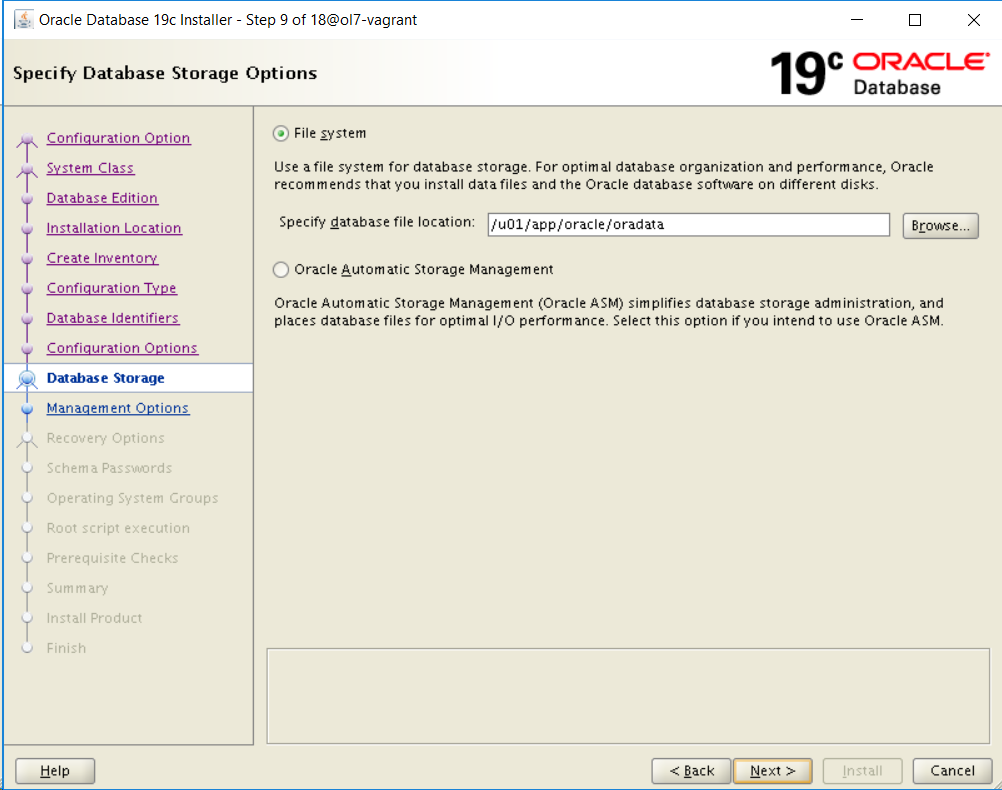
No EM for now as I'm low in memory =P
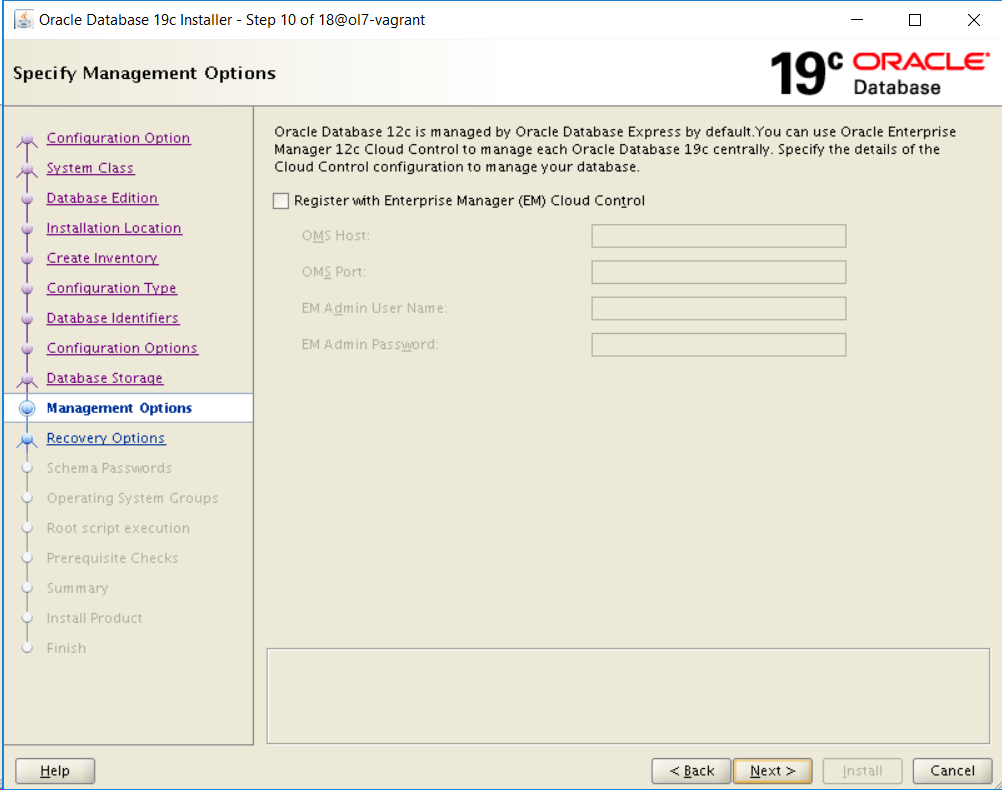
Also no Recovery, as this is for testing new features only:
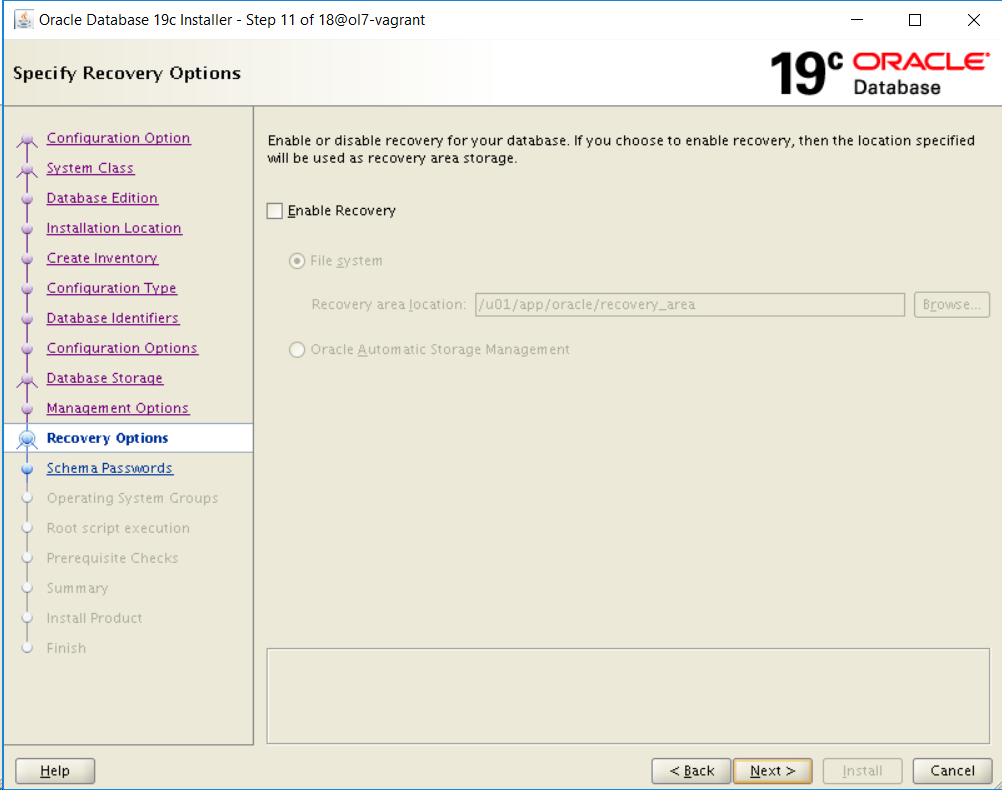
Time to set password. Here I will put "oracle" for everyone:
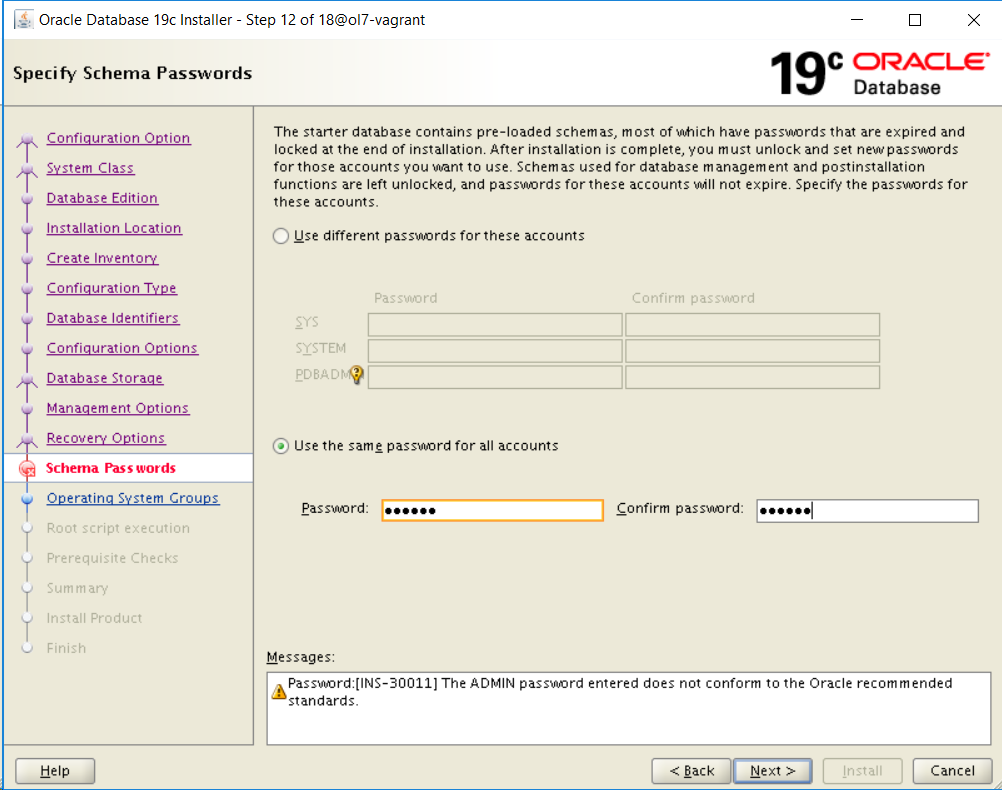
Check the OS groups:
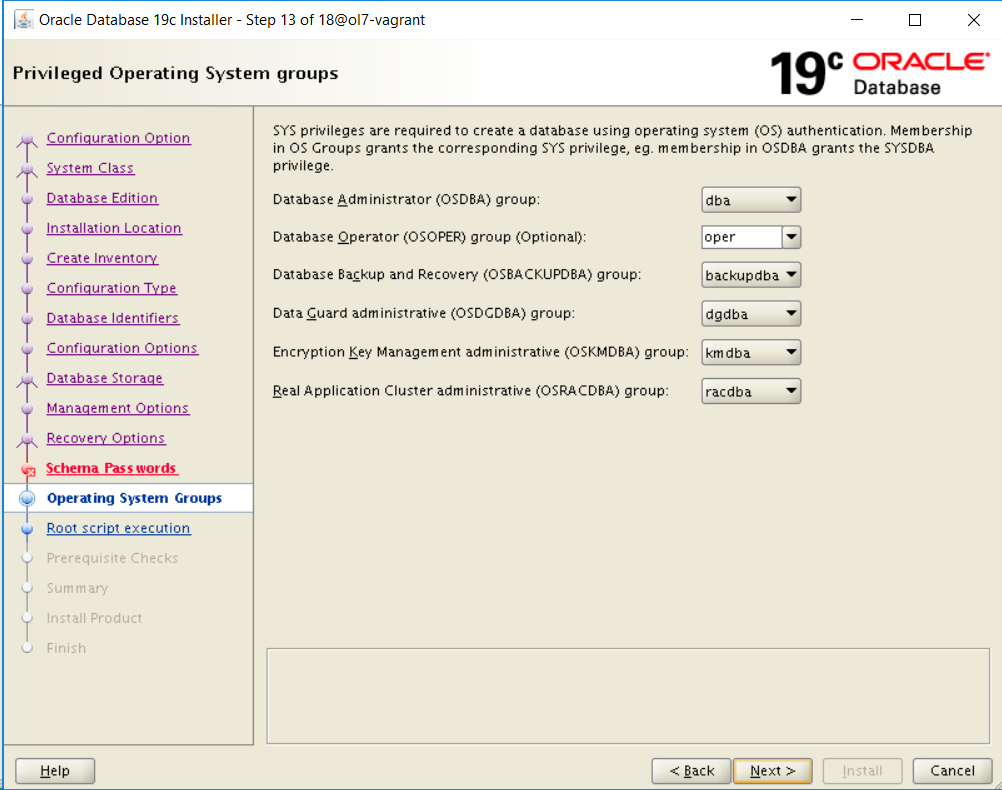
In the next screen, I define that I will execute manually the root scripts.. I don't like to type my root password anywhere but in the console or give sudo to oracle:
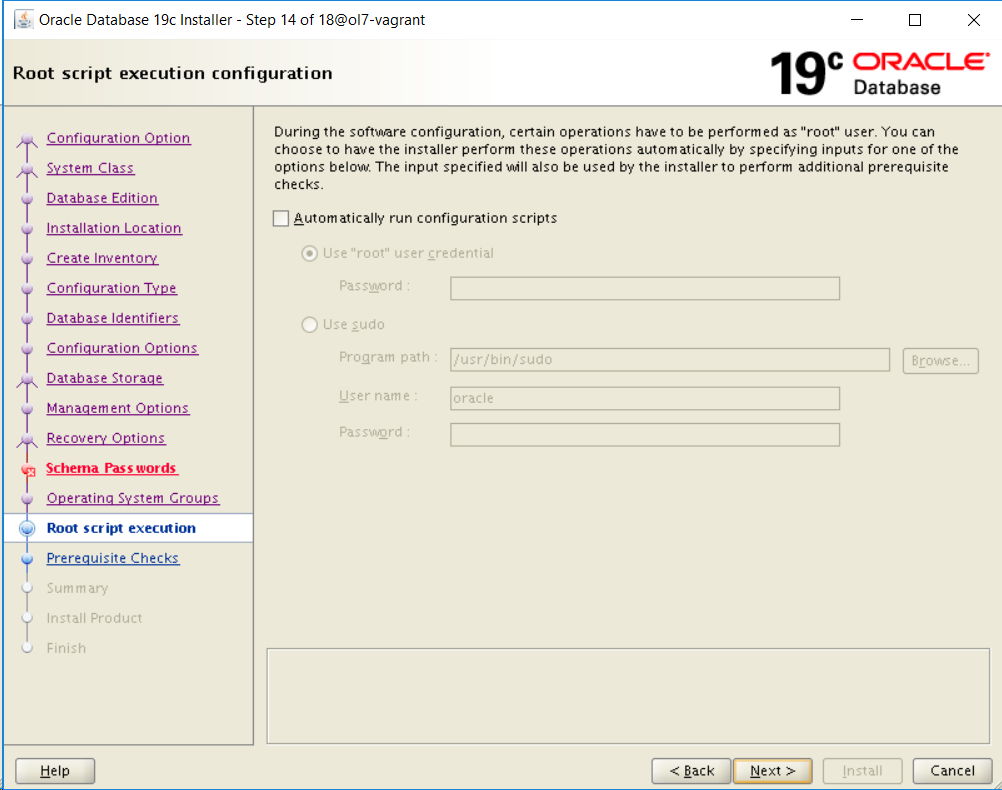
In next screen database will performe the prereq checks:
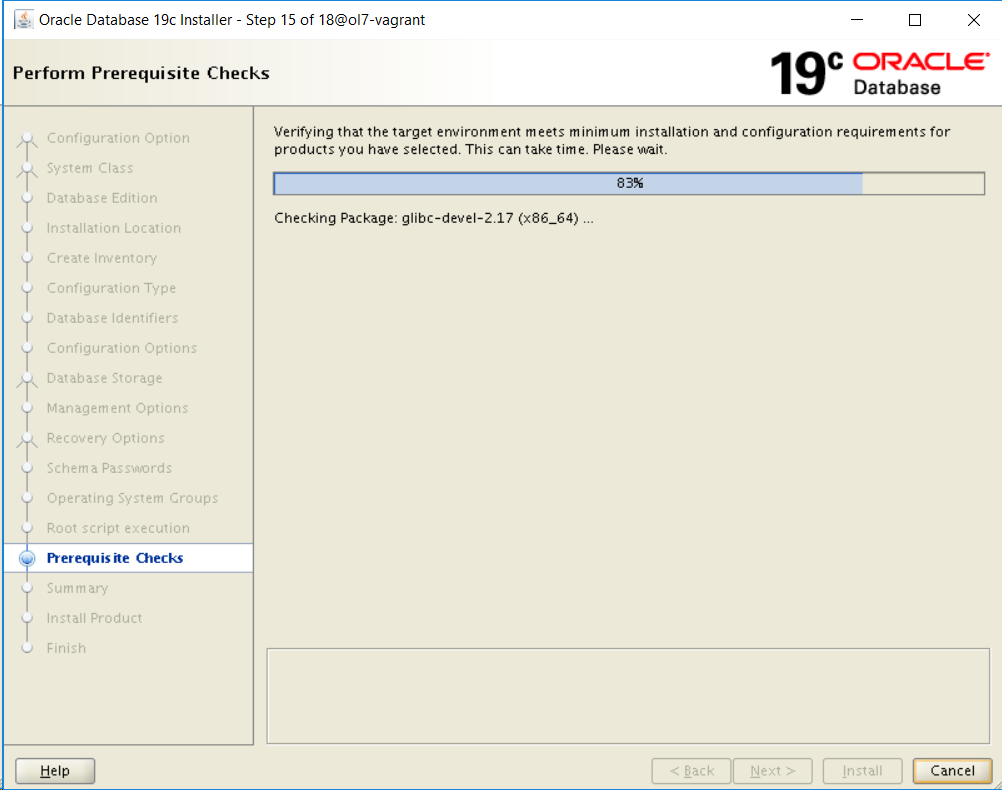
Check the Summary.
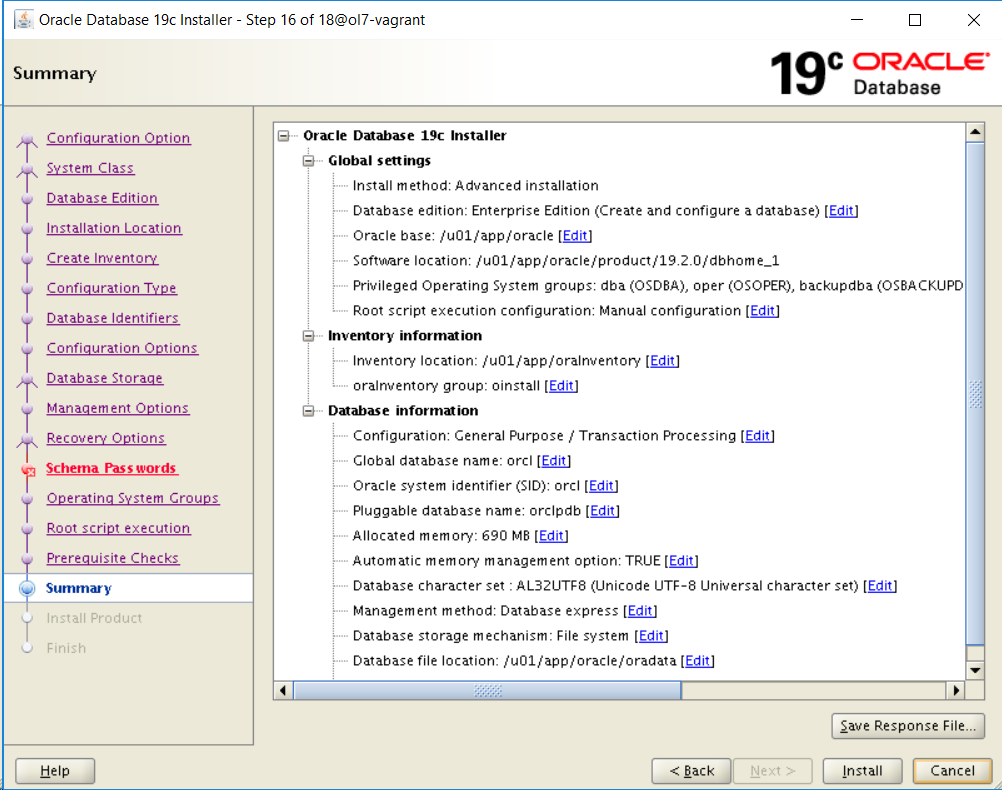
Press Install and installation will start.
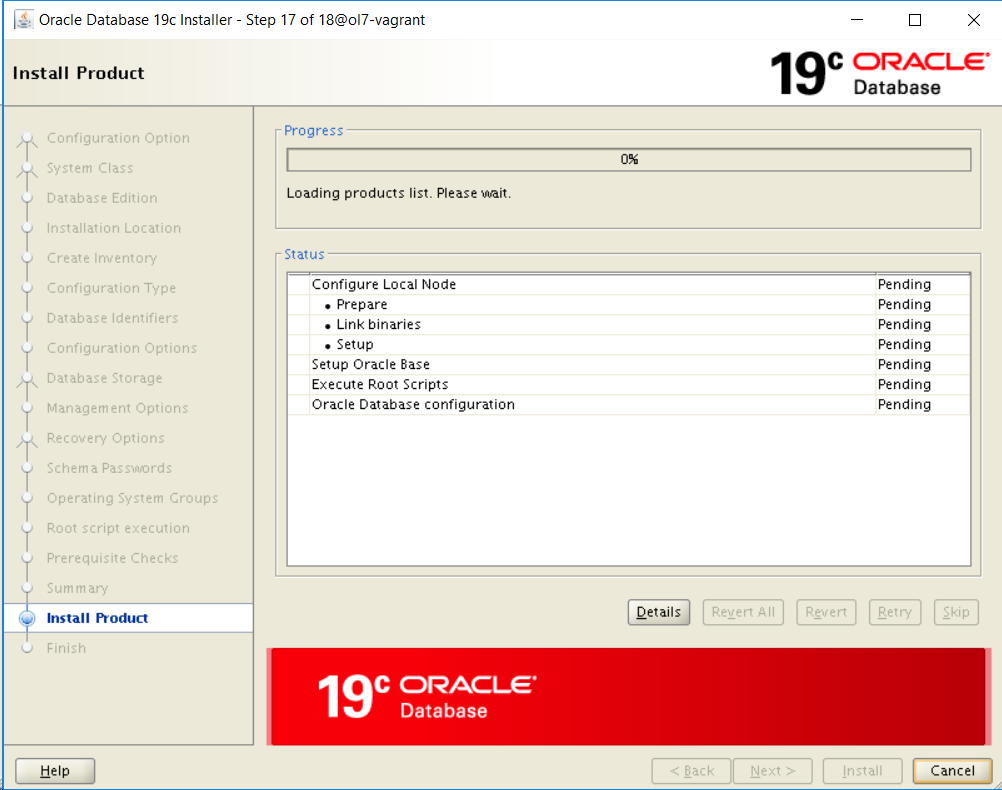
Wait for installation to prompt for scripts execution:
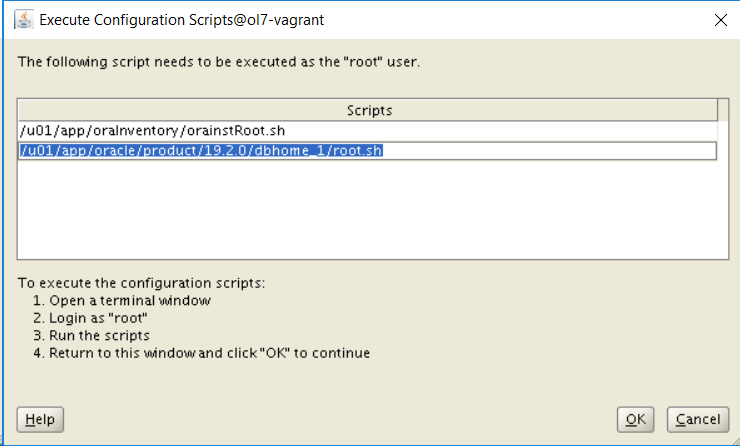
Time to run root scripts:
[root@ol7-vagrant ~]# /u01/app/oraInventory/orainstRoot.sh Changing permissions of /u01/app/oraInventory. Adding read,write permissions for group. Removing read,write,execute permissions for world. Changing groupname of /u01/app/oraInventory to oinstall. The execution of the script is complete. [root@ol7-vagrant ~]#
[root@ol7-vagrant ~]# /u01/app/oracle/product/19.2.0/dbhome_1/root.sh
Performing root user operation.
The following environment variables are set as:
ORACLE_OWNER= oracle
ORACLE_HOME= /u01/app/oracle/product/19.2.0/dbhome_1
Enter the full pathname of the local bin directory: [/usr/local/bin]:
Copying dbhome to /usr/local/bin ...
Copying oraenv to /usr/local/bin ...
Copying coraenv to /usr/local/bin ...
Creating /etc/oratab file...
Entries will be added to the /etc/oratab file as needed by
Database Configuration Assistant when a database is created
Finished running generic part of root script.
Now product-specific root actions will be performed.
Oracle Trace File Analyzer (TFA - Standalone Mode) is available at :
/u01/app/oracle/product/19.2.0/dbhome_1/bin/tfactl
Note :
1. tfactl will use TFA Service if that service is running and user has been granted access
2. tfactl will configure TFA Standalone Mode only if user has no access to TFA Service or TFA is not installed
[root@ol7-vagrant ~]#
Press OK and wait a few more steps:
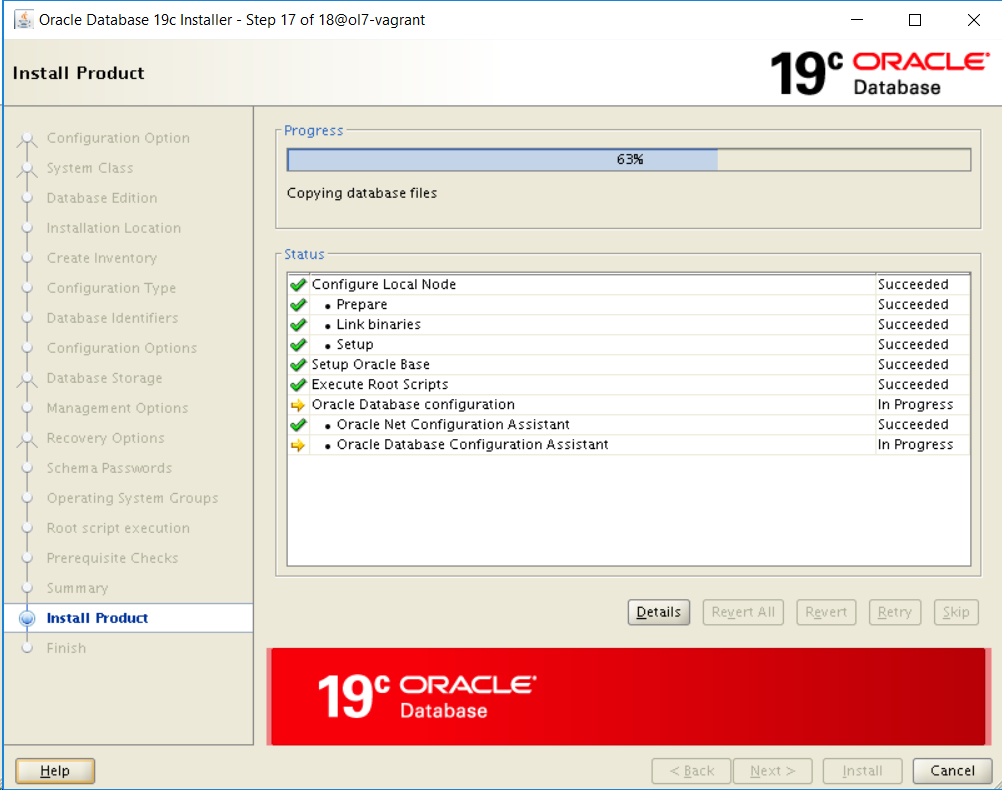
The database creation part is usually the who lasts longer..
And finally it's completed:
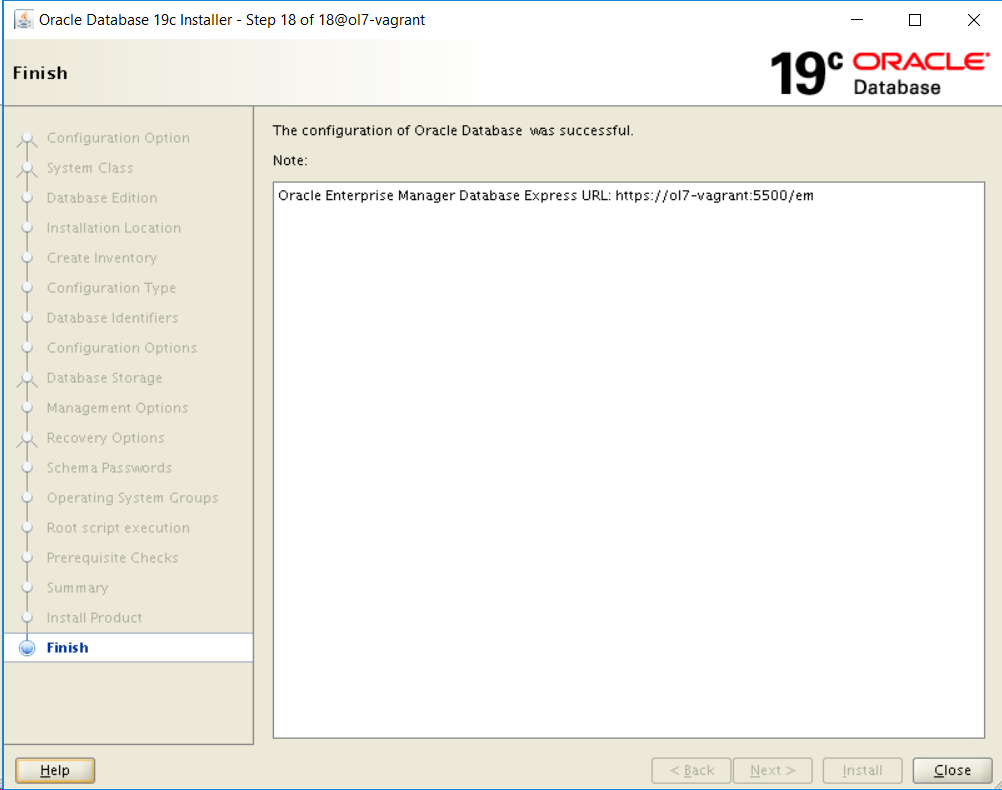
This last screen is has a buggy message, as I didn't asked for EM.
Installation DB Install can be found here: db_install.rsp
Everything worked like a charm. And finally time to test:
[oracle@ol7-vagrant ~]$ export PATH=$PATH:$ORACLE_HOME/bin
[oracle@ol7-vagrant ~]$ export ORACLE_SID=orcl
[oracle@ol7-vagrant ~]$ sqlplus / as sysdba
SQL*Plus: Release 19.0.0.0.0 - Production on Thu Feb 14 18:13:15 2019
Version 19.2.0.0.0
Copyright (c) 1982, 2018, Oracle. All rights reserved.
Connected to:
Oracle Database 19c Enterprise Edition Release 19.0.0.0.0 - Production
Version 19.2.0.0.0
SQL> show pdbs
CON_ID CON_NAME OPEN MODE RESTRICTED
---------- ------------------------------ ---------- ----------
2 PDB$SEED READ ONLY NO
3 ORCLPDB READ WRITE NO
SQL>
Time to play with it. Have fun!
Have you enjoyed? Please leave a comment or give a 👍!







3 comments
Nice, very informative, keep going Rodrigo !!
Well , didn't try to download/install as I have been misleaded by the comment "Exadata only". Will try it on my OVM infra in one of my OEL7.6 VM's. Thanks a lot Rodrigo for the compact but useful info !! Nice roadmap.
Succeeded on OVM
vmoralin19c : 2 Vcpu's , 10 Gb RAM , 20 Gb swap , Oracle Linux Server release 7.6
1 iSCSI / ocfs2 local disk of 600 Gb (no LVM neither CLVM)
DB-creation (O19) took indeed 4 times the time of software-install
Regarding your EM-comment , the installer installed DB Express (https://vmoralin19c:5501/em) which is a local subset of the real OEM (and indeed not configured as indicated/asked => no oraagent installed & configured to join a central OEM)
Anyway , clear and effective "roadmap to install 19c".
Did you find some time to install Grid/Clusterware 19c as well ?
K r,
Yves